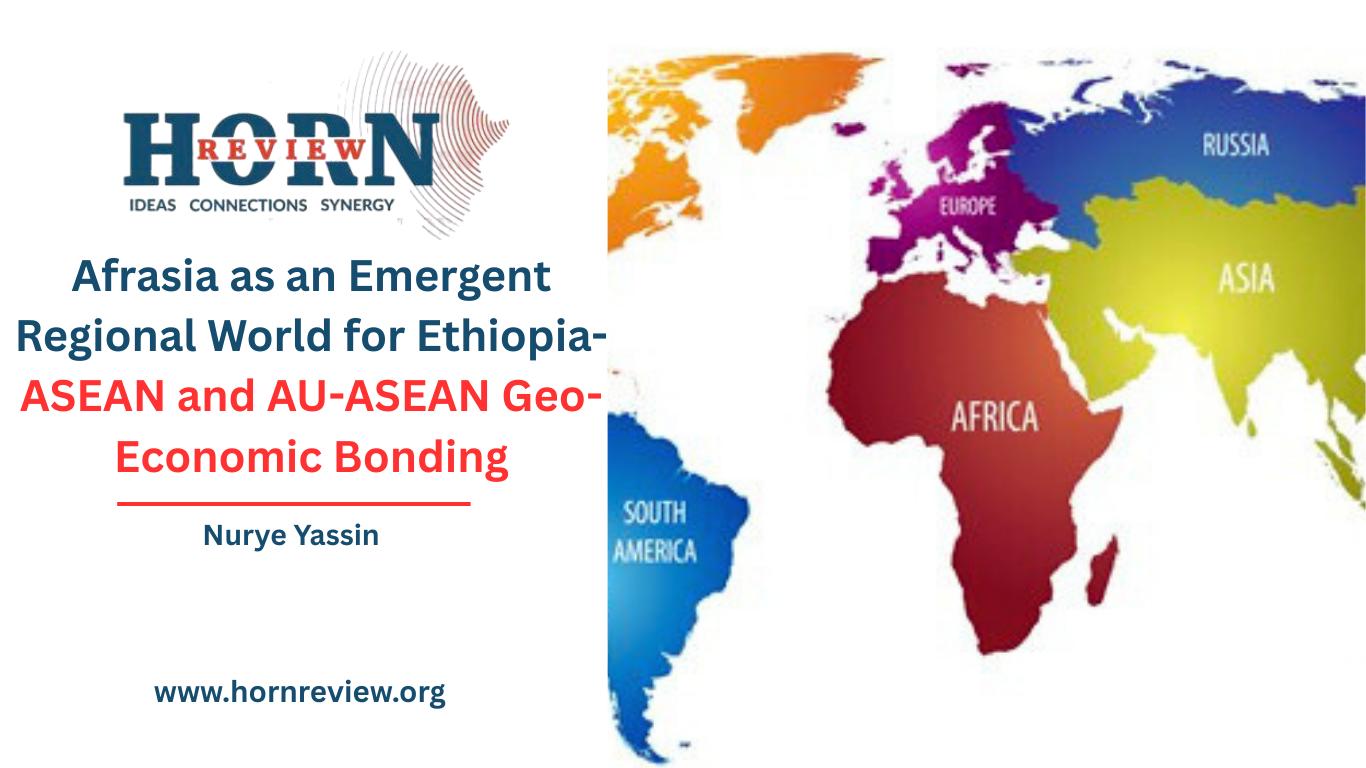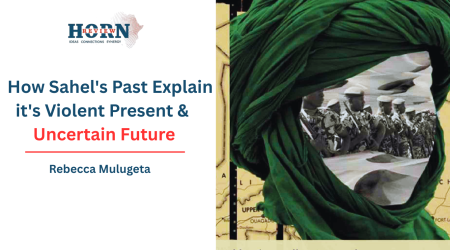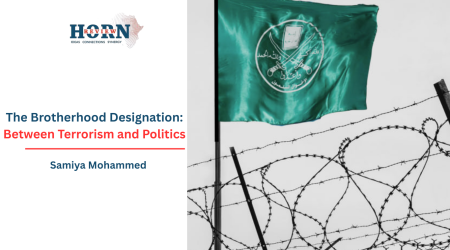
24
Nov
Afrasia as an Emergent Regional World for Ethiopia-ASEAN and AU-ASEAN Geo-Economic Bonding
Global Contest for the Meaning of the World
We see the intensified global contest over the meaning of the world as the world continues to exhibit structural and phenomenal transformations. This structural change of era brings new and re-merging centers of geo-epistemic, geo-economic, geo-political, and geo-technological powers disputing the existing model, knowledge, and capital of the world.
This heated global competition over meaning of the world is indicative of the efforts at exploring non-linear and plurilateral ways of understanding, observing, explaining, reading, shaping, and being in the world. These global “world-making” processes are an all-encompassing one re-territorializing the geography of the world with competing global connectivity visions and dynamics.
We see new spaces of world-making, including America’s sovereignty-focused MAGA, China’s Belt and Road Initiative, the European Union’s Global Gateway, Turkey’s Middle Corridor, Iran’s Civilizational Crossroads, Russia’s Greater Eurasia, and India’s Multi-Alignment, among others.
Moreover, we continue to witness new sites of world-making privileging Active Non-Alignmnet, Strategic Autonomy, Issue-Specific Alignment, Multi-Vector Diplomacy, and Neutrality, mainly prioritized by the countries of the southern hemisphere focused on the bread and butter issues of development and preservation of strategic autonomy.
We are witnessing a new reading and unraveling of the historical change of the world that goes beyond the conflictual binary of the East versus West frame of reference, which solely accounts the great power rivalry erasing the agencies, connectivities, processes and relations of the various world regions.
The Najashi Spirit in Continuum
The optic, that privileges regional imaginaries that account the historical, present and future diversity and connectivity of the various world regions omni-enmeshed for millennia, is rekindling the Najashi spirit—a Christian Ethiopian King who gave sanctuary to the Muslims (companions of the Prophet) under oppression by the rulers of Quraish that continues to embedd Ethiopia in the Islamic world as the land of two Hijrahs (Migrations).
Prime Minister Abiy Ahmed of Ethiopia went to the Malay world of Malaysia and met Prime Minister Anwar Ibrahim of Malaysia in October 2024 in Kuala Lampur for discussion on matters of mutual importance. Both leaders, deliberating on issues of geo-economic interdependence in traditional and emerging productive forces, revisited the Najashi spirit, Ethiopia’s place in Islamic history, and its implications to today’s world that is divided along religious and cultural lines. The Najashi spirit is an answer to the modern problems of the world.
The Najashi spirit, making Samuel P. Huntington’s “Clash of Civilizations” as a departure point and signaling the importance of Edward Said’s “The Clash of Ignorance”, offers a new paradigm of civilizational relationality manifested in the lived historical reality of Ethiopia’s “unity-in-civilizational diversity.” Ethiopia is a living expression of that historical and contemporary reality.
Afrasia: Making the Bandung Spirit Alive
We see the emergence of regional worlds emanating from the “non-aligned” world of Asian-African solidarities of the 1950s grounded on the principles of the Bandung spirit that merges Africa and Asia as one geo-cultural, geopolitical, and geo-economic theatre for political sovereignty and economic autonomy.
The two Pan-African intellectuals, Ali Mazrui and Seifudein Adem, who co-authored a book titled “Afrasia: A Tale of Two Continents,”used the term Afrasia to highlight Africa’s linkages with that of China, India and Japan. This piece uses the term Afrasia in its broader sense entwining Ethiopia and Africa with that of the Association of Southeast Asian Nations (ASEAN), including Malaysia, Indonesia, Vietnam and Singapore, for trans-regional connectivity and geo-economic interdependence.
Ethiopia, valuing its long-standing relations with the ASEAN countries first established during the Bandung Conference, makes new inroads bolstering its exchange of high-level visits with the countries of ASEAN that emerge as new centers of economic vitality. Inheriting the tradition of the non-aligned world of Africa and Asia and Bandung spirit, Ethiopia seeks to forge the strategic synergy of the African Union (AU) and ASEAN.
Towards this end, Ethiopia employs Medemer or Synergy as its diplomatic thought aiming at exploring and promoting the synergy of civilizations as a foundation and pathway for the building of regional worlds, including Afrasia and Afrabia, centered on geo-economics. This can be seen as Ethiopia’s response to the changing world situation diversifying its economic partnerships with vital regional blocs, including ASEAN.
ASEAN countries being as a new center of economic gravitas are seeking economic collaboration with likeminded countries to overcome the geo-economic shocks arising from the geopolitical rebalancing. The Malaysian and Singaporean leaders have paid official visits to Ethiopia in November, 2025 and explored ways for closer coordination at regional and global multilateral settings as well as greater geo-economic alignment of their economies with that of Ethiopia and the rest of Africa for greater connectivity and geo-economic cooperation.
Ethiopia: A Strategic Bridge between Africa and Southeast Asia
Ethiopia’s efforts at geo-economizing its inernational policy with the dynamic countries of ASEAN is all about reclaiming the Bandung spirit in the new era with the new optic of Afrasia, seeking to create a regional world that promotes the convergence of respective regional visions for stronger geo-economic development and alignment in a world that is fragmenting, de-globalisng and geo-economically tribalizing.
This enhanced engagement between Ethiopia with economies of ASEAN entails the fact that Ethiopia stands committed to strengthen Ethiopia-ASEAN relations in innovation, green energy, smart city development and digital transformation. Ethiopia guided by the idea of Afrasia as a regional world seeks to open a new chapter in regional cooperation. In fact, Ethiopia strives for the alignment of AU Agenda 2030 and the ASEAN Community Vision 20545. As a key player of in the African Continental Free Trade Area (AfCFTA), Ethiopia offers ASEAN nations a gateway to the African market positioning itself as a bridge between the two regions for greater connectivity and geo-economic cooperation.
Recent Ethiopia’s engagement with ASEAN countries is poised to deepen partnerships as the fragmented world requires countries for more enhanced partnership. In order to navigate the disorderly world, Ethiopia strives for trans-regional unity framed by the lens of Afrasia. In this regard, Ethiopia should go a long way initiating an Ethiopia-ASEAN Sectoral Dialogue Partnership to enhance policy coordination. Additionally, Ethiopia should propose an AU-ASEAN Strategic Partnership to foster deeper cooperation. Ethiopia and AU’s enhanced engagement with ASEAN plays a pivotal role in stabilizing the disrupted world order.
Afrasia: Towards a Geo-economized Regional World
Afrasia as a new regional world brings African and Southeast Asian countries as a single unit and combines respective competences in order to channel the combined strengths for the finalization of the unfinished business of economic sovereignty of the countries of Africa and Southeast Asia.
Afrasia can be understood as a process of merging the imaginaries, economies, and communities of the two regions for a geo-economic bonding taking a middle ground in the conflict between the old and new worlds, enhancing cooperation for collective economic empowerment, making the two regions “central” in their international relations, and playing a lead role in moderating and stabilizing the global geopolitical contest.
Afrasia expresses itself in diplomacy of deeds as a crucial region-building process through summitries and exchanges of high-level visits of the two critical regions of the world linking the Indian and Pacific Oceans as points of international cooperation.
Afrasia is a space of world-making for geo-epistemic and geo-economic interdependence of Africa and Asia with a focus on amplifying their voice, securing autonomy and achieving prosperity while contributing for the preservation of world peace and betterment of humanity.
The piece ends with the words of the Pan-African intellectual griot of the 20th century Ali Mazrui who globalizes Africa with other regions of the world seeing the human race as his family: “The streams of history, as well as the waters of the Indian Ocean, continue to link the shores of Africa and her Asian neighbors.”
By Nurye Yassin, Independent Researcher on Gulf-Horn Relations










